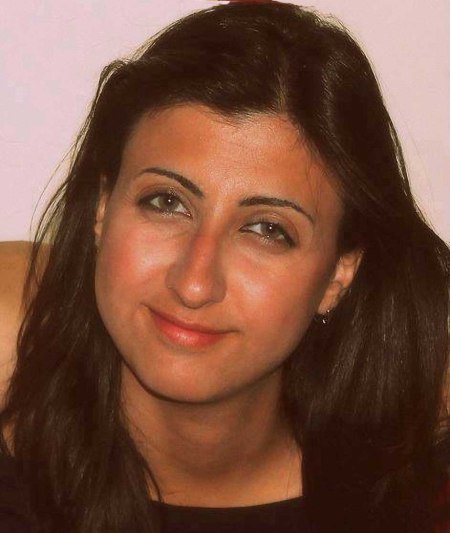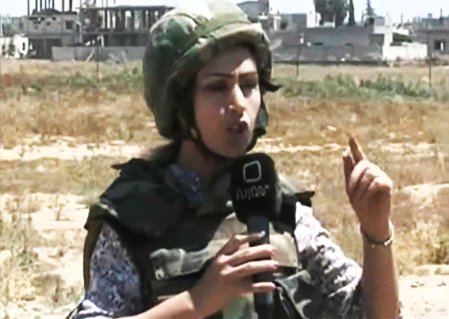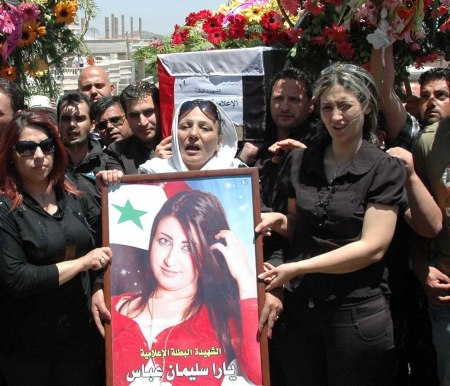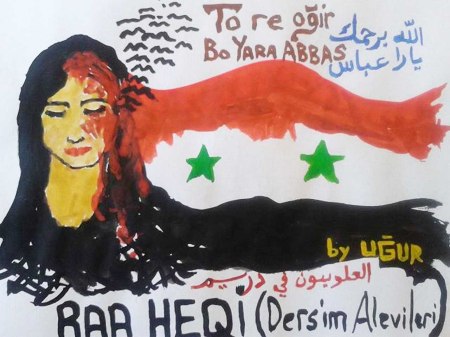Sharmine Narwani – MideastShuffle
I met Al Ikhbariya journalist Yara Abbas for the first and only time in August 2012. I was organizing my trip into Aleppo and was looking to talk to someone on the ground about safety issues. An acquaintance of Yara’s who worked at my hotel told me he knew a journalist on the front lines of the conflict in Aleppo, and gave me her number. When Yara and I finally spoke, she was on her way back to Damascus and warned me down the phone line about the road between Aleppo and its airport, at the time subject to random checkpoints set up by armed rebels.
The connection wasn’t great. “Look – I reach Damascus tonight. Why don’t we meet tomorrow and talk in person,” she kindly suggested via mobile.
The following day I headed to her temporary offices off Ummayad Square. In June, Al Ikhbariya’s headquarters had been bombed by Jabhat al-Nusra, gutting the building and killing seven members of staff, including three journalists. The new facilities where I met Yara had also been recently bombed, but on a much smaller scale — I think only one studio was destroyed.
Yara had rushed back to Damascus from nine straight days embedded with Syrian troops in Aleppo to await news about her roommate and fellow Al Ikhbariya colleague Yara Saleh — recently kidnapped by rebels along with three other crew members, one of whom, Hatem Abu Yehia, was later executed.
Our conversation was interrupted by phone calls from friends and colleagues calling to commiserate over Saleh’s kidnapping. Yara was clearly shaken by the news and teared up several times during these calls.
She was a striking young woman in her mid 20s — slender, tall, huge green eyes framed by long dark hair. Most notable though were her immaculately manicured long fingernails. A solitary girlish vanity on the front lines of combat, I smiled to myself.
I rarely have reason to interview members of the media. My only two exceptions have both been related to the Syrian conflict — the first, Paul Conroy, the freelance Sunday Times cameraman injured in Homs whom I interviewed outside his London hospital — and now Yara.
Although I went to meet Yara for tips on how to avoid the dangers of Aleppo, I ended up taking some notes because she was providing accounts and impressions of events that, at the time, were still novel.
I wish I had taken more notes — at some point fairly early on, I just stopped writing and focused on listening to her stories. Some of the things I recall from our conversation that I didn’t commit to paper are details about army tactics. The soldiers she had just left behind in Aleppo, for instance, moved in small groups from house to house, and street to street. I had looked into this subject in June during a trip to learn more about the army’s recent escalation of military operations in hotspots around the country after the UN mission had failed to establish a ceasefire.
Contrary to what is reported widely in the media, until — and even after — the Syrian military introduced their air force into the conflict, ground troops continuously and systematically waged small-scale operations in neighborhoods occupied by opposition militias. This usually starts with gathering intelligence on where rebels store their weapons, who they are, where they live — getting the lay of the land, so to speak — and then moves on to small ground operations to target and destroy these networks.
Yara’s account of her nine days embedded with the army in Aleppo confirmed this for me, but she surprised me with the information that the soldiers she travelled with mostly slept in the conflict zone itself — in a vacant home or sometimes on the street. Having wrested back territory, they were unwilling to leave it for the night. When I asked her if she was afraid, Yara was emphatic that she has never been afraid of moving in sniper-filled corridors. She told me that the soldiers — whom she had first met in Damascus and then followed into Aleppo — protected her with their lives and made her feel safe.
When I heard of Yara’s death this week — at the hands of a sniper, no less — my first thought, oddly, was this: The Syrian army soldiers who she admired so much were not there to protect her as her car raced out of war-torn Qusayr.
Here is Yara last August, in her own words:
On the scene in Aleppo: At the beginning there were still civilians in these areas (in Aleppo’s contested neighborhoods), now maybe 20 percent remain.
I went with the army and knocked at the door of one woman. She started to cry — please take me out of here. They removed her and took her to her brother’s home. The militias make holes in the walls of homes to go from building to building to avoid being out in the open. Seventy percent of the destruction there is from militias. I saw 12 big bombs and 35 small ones in a home they had taken over.
You see the same militia patterns in Homs as in Aleppo — there are no tactical differences. Their plan is to gain weapons, kill Syrian soldiers, hit government buildings.
On the militias: I saw three from Lebanon, one from Africa, from Libya. All of the ones whose passports we found in their hideout had travelled to Saudi Arabia, Cyprus and Turkey — there are stamps in their passports. Some of their weapons are coming on the Lebanon-Syria border via donkeys.
They send out women and kids to see where the soldiers are, what they are doing. I saw a woman with a stroller myself — soldiers asked me to go talk to her. She had guns in her pram that she was delivering to militias.
They sent an old man past one checkpoint saying he wants to go check on his home — he had a bomb on him and they detonated it.
FSA has very developed weapons, and they have all kinds of weapons. Bombs, Doshkas (heavy machine guns) and Shilkas (radar-guided anti-aircraft systems), anti-tank weapons, anti-aircraft weapons. An anti-aircraft weapon was just used in Idlib.
I’ve become so much more determined and strong after my time in Aleppo. They put a mask of religion on their face — they are not fighting for true issues. Their demands for freedom are false. Look at what they are doing to civilians. They say they want to stop the violence, but they’re committing the violence.
If they were true, they would not have a weapon. They would be unable to kill the Syrian people. There are a lot of Islamists who are also rejecting these militias because they know they are not fighting for Syrian progress. Yes, there are people who are helping them, but also a lot of Islamists who are refusing this way. I saw this myself in the middle of Salaheddine (a heavily contested Aleppo neighborhood). They (pious Syrians) stayed home and prayed, but wouldn’t open the door to the militias. They were scared.
This varies in areas. In Hajjar al-Aswad (Damascus suburb) about 80 percent are pro-militia. About 90 percent in Aleppo are with the government now.
On the Syrian army: You see our soldiers when they are attacked, sometimes when they are dead. You cannot be separated from this. These soldiers know they’re going to be killed. They stand in the middle of the street and shoot — they are not afraid. They have a mission.
A soldier from Talbiseh (near Homs) has seven gunshots in his body from Duma and he’s come back to fight.
From Rastan, Deraa, Idlib — all of them don’t want to leave — they want to stay and fight.
One soldier, a Sunni from Idlib, had a gunshot in his leg — he refused to leave the army. He went to the hospital and came back the next day to fight in Aleppo. In Idlib militias put pressure on his family to make him leave the army — they took his brother for a while, beat him up a bit. But the soldier said “they can take my whole family, but not my country.” I did a story on him.
The group of soldiers I’m with in Aleppo I met in Damascus. Before that they were in Homs and Deraa. They are so young yet they’re so strong.
Yara is listed as the 38th media casualty of the Syrian conflict — by any standard that is a shocking number of journalists to have lost their lives covering a story. It appears that reporters in Syria are increasingly being singled out for execution. Whichever perspective a journalist brings to this highly contested media war over Syria, death is surely undeserved.
Rest in peace, Yara Abbas.
May all of you rest in peace:
Abdul Raheem Kour Hassan, Watan FM
Unknown, in Damascus, Syria
Unknown, in Damascus, Syria
Ghaith Abd al-Jawad, Qaboun Media Center
March 10, 2013, in Damascus, Syria
March 10, 2013, in Damascus, Syria
Amr Badir al-Deen Junaid, Qaboun Media Center
March 10, 2013, in Damascus, Syria
March 10, 2013, in Damascus, Syria
Walid Jamil Amira, Jobar Media Center
March 3, 2013, in Damascus, Syria
March 3, 2013, in Damascus, Syria
Mohamed al-Mesalma, Al-Jazeera
January 18, 2013, in Daraa, Syria
January 18, 2013, in Daraa, Syria
Yves Debay, Assault
January 17, 2013, in Aleppo, Syria
January 17, 2013, in Aleppo, Syria
Suhail Mahmoud al-Ali, Dunya TV
January 4, 2013, in Damascus, Syria
January 4, 2013, in Damascus, Syria
Naji Asaad, Tishreen
December 4, 2012, in Damascus, Syria
December 4, 2012, in Damascus, Syria
Mohamed Quratem, Enab Baladi
November 28, 2012, in Darya, Syria
November 28, 2012, in Darya, Syria
Mohamed al-Khal, Freelance
November 25, 2012, in Deir al-Zour, Syria
November 25, 2012, in Deir al-Zour, Syria
Basel Tawfiq Youssef, Syrian State TV
November 21, 2012, in Damascus, Syria
November 21, 2012, in Damascus, Syria
Hozan Abdel Halim Mahmoud, Freelance
November 19, 2012, in Ras al-Ain, Syria
November 19, 2012, in Ras al-Ain, Syria
Mohammed al-Ashram, Al-Ikhbariya
October 10, 2012, in Deir Al-Zour, Syria
October 10, 2012, in Deir Al-Zour, Syria
Mona al-Bakkour, Al-Thawra and Syria al-Qalaa
October 3, 2012, in Aleppo, Syria
October 3, 2012, in Aleppo, Syria
Maya Naser, Press TV
September 26, 2012, in Damascus, Syria
September 26, 2012, in Damascus, Syria
Abdel Karim al-Oqda, Shaam News Network
September 19, 2012, in Hama, Syria
September 19, 2012, in Hama, Syria
Yusuf Ahmed Deeb, Liwaa Al-Fatih
September 16, 2012, in Aleppo, Syria
September 16, 2012, in Aleppo, Syria
Tamer al-Awam, Freelance
September 9, 2012, in Aleppo, Syria
September 9, 2012, in Aleppo, Syria
Mosaab al-Obdaallah, Tishreen
August 22, 2012, in Damascus, Syria
August 22, 2012, in Damascus, Syria
Mika Yamamoto, Japan Press
August 20, 2012, in Aleppo, Syria
August 20, 2012, in Aleppo, Syria
Ali Abbas, SANA
August 11, 2012, in Damascus, Syria
August 11, 2012, in Damascus, Syria
Hatem Abu Yehia, Al-Ikhbariya
August 10, 2012, in Al-Tal, Syria
August 10, 2012, in Al-Tal, Syria
Mohammad Shamma, Al-Ikhbariya
June 27, 2012, in Doursha, Syria
June 27, 2012, in Doursha, Syria
Sami Abu Amin, Al-Ikhbariya
June 27, 2012, in Doursha, Syria
June 27, 2012, in Doursha, Syria
Ahmed al-Assam, Freelance
May 28, 2012, in Homs, Syria
May 28, 2012, in Homs, Syria
Bassel al-Shahade, Freelance
May 28, 2012, in Homs, Syria
May 28, 2012, in Homs, Syria
Ahmed Adnan al-Ashlaq, Shaam News Network
May 27, 2012, in Damascus, Syria
May 27, 2012, in Damascus, Syria
Lawrence Fahmy al-Naimi, Shaam News Network
May 27, 2012, in Damascus, Syria
May 27, 2012, in Damascus, Syria
Ammar Mohamed Suhail Zado, Shaam News Network
May 27, 2012, in Damascus, Syria
May 27, 2012, in Damascus, Syria
Anas al-Tarsha, Freelance
February 24, 2012, in Homs, Syria
February 24, 2012, in Homs, Syria
Rémi Ochlik, Freelance
February 22, 2012, in Homs, Syria
February 22, 2012, in Homs, Syria
Marie Colvin, The Sunday Times
February 22, 2012, in Homs, Syria
February 22, 2012, in Homs, Syria
Rami al-Sayed, Freelance
February 21, 2012, in Homs, Syria
February 21, 2012, in Homs, Syria
Mazhar Tayyara, Freelance
February 4, 2012, in Homs, Syria
February 4, 2012, in Homs, Syria
Gilles Jacquier, France 2
January 11, 2012, in Homs, Syria
January 11, 2012, in Homs, Syria
Basil al-Sayed, Freelance
December 27, 2011, in Homs, Syria
December 27, 2011, in Homs, Syria
Ferzat Jarban, Freelance
November 19 or 20, 2011, in Al-Qasir, Syria
November 19 or 20, 2011, in Al-Qasir, Syria




Keine Kommentare:
Kommentar veröffentlichen